Cynicism is tempting. It hovers constantly at the edge of every hopeful moment, whispering “it will never happen.” It looks intelligent. It looks wry and elegant and worldly.
And it has never managed to ensnare Luna Lovegood.
Luna has spent years being told to give up. She has spent years being told that if she doesn’t give up, she’ll be left alone, barefoot and reviled. She has spent years among the Ravenclaws, being treated as stupid because she will not bend to cynicism.
She is precisely what the rebellion needs.
Luna joins Dumbledore’s Army because she believes. She believes that Voldemort has returned, because she believes people who tell her they’re in danger. Because her friend bears a scar.
She believes that an army must rise up to fight The Dark Lord. She believes that he can be defeated.
She believes that she can be a part of that fight.
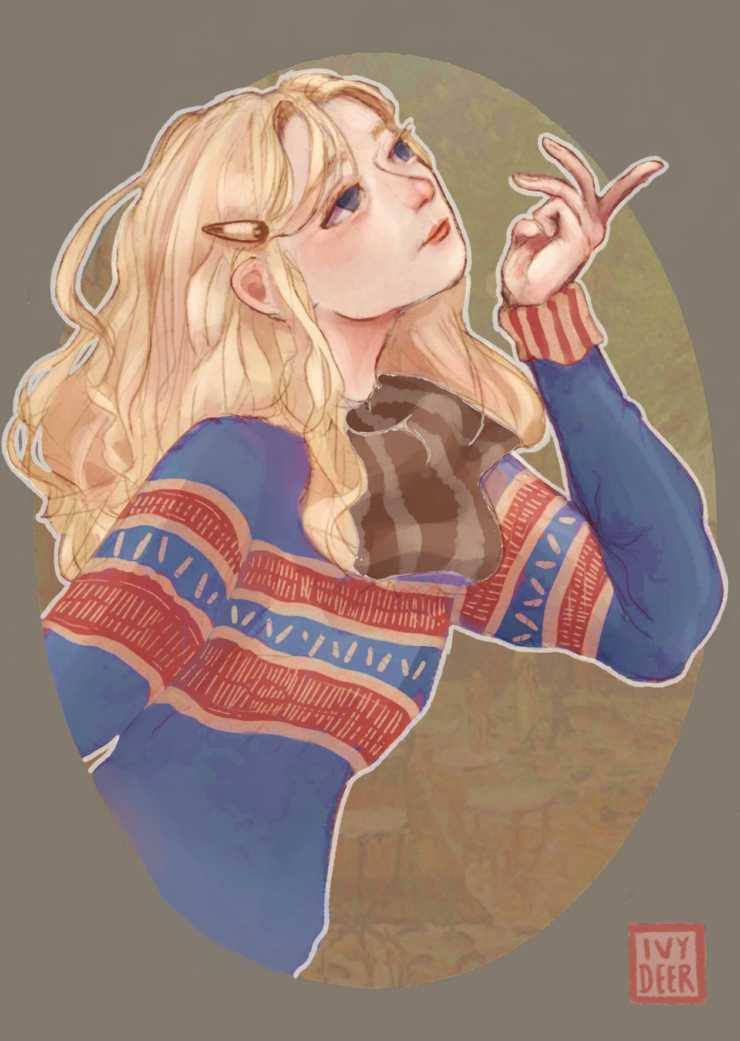
If anyone is entitled to cynicism, it’s Luna.
She watched her mother die when she was just nine years old. That’s old enough to remember every second of her mother’s death. More than Harry Potter ever remembered of his mother’s death, at least on his own—more than a green flash and a scream.
She saw the whole thing, and it would be a mercy if she managed to forget an instant of it.
But if there’s anything that is true about Luna, it’s this: she doesn’t forget.
She doesn’t let go.
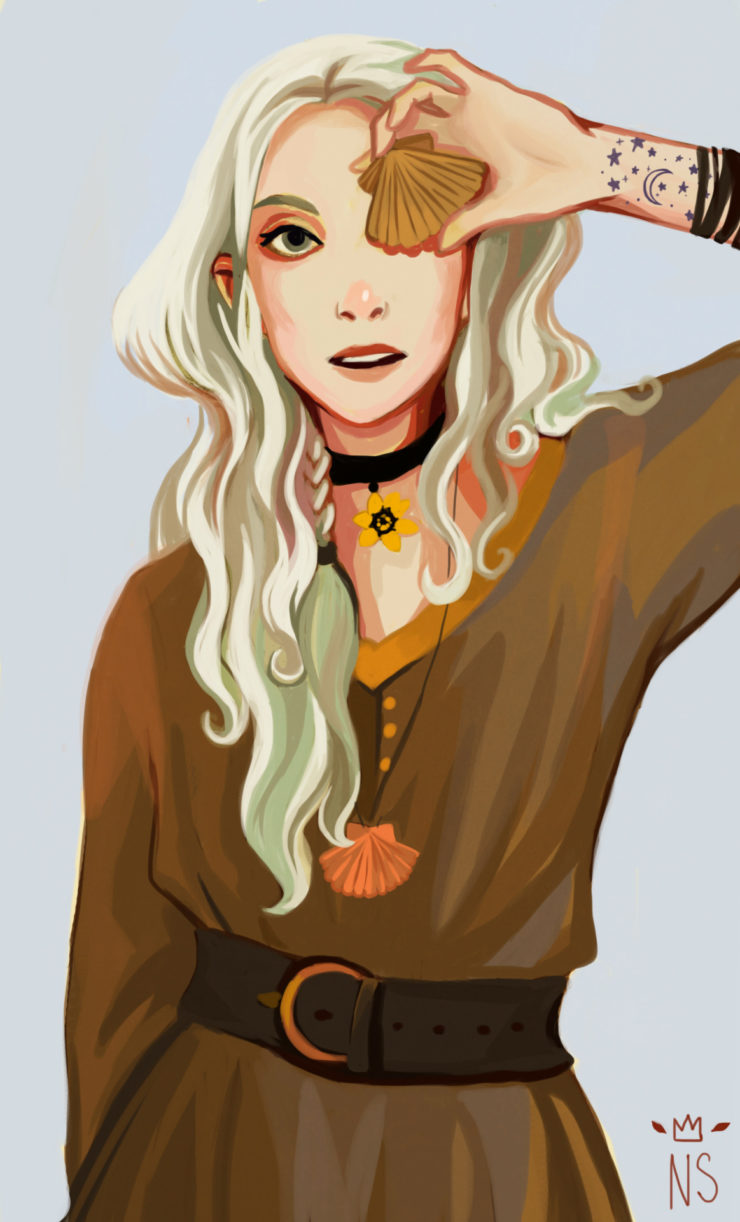
By all rights, Luna should be a bone-deep misanthrope. It’s all anyone seems to want her to be. Her dogged belief in things beyond scholarly understanding paints a target on her back, and throughout her childhood, she’s bullied for her relentless optimism. She doesn’t just insist on believing in things she cannot see—it’s far worse than that.
She insists on believing in herself.
It’s not that Luna is oblivious. It’s not that she doesn’t know about the nicknames. When her shoes are stolen and her possessions scattered every year, she knows she’s being bullied. She knows she’s not cool. She knows that people don’t respect her.
But she respects herself anyway.
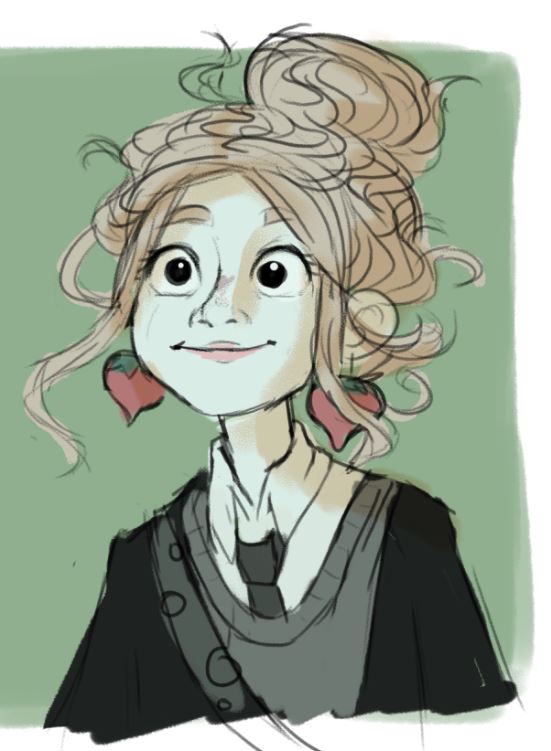
How does she do it? How does Luna resist the tidal pull of popular opinion? She’s described as having her head in the clouds so often that it’s easy to forget how incredibly grounded she is. Her roots run deeper than those of her classmates—she’s grounded in belief, unwavering and unmitigated by the scorn of her peers. How?
It’s easy to speculate. Perhaps it’s because she’s anchored to tragedy, or perhaps it’s because she’s been drawn in by the strong will and fervent mind of her father. He believes in the unbelievable, and without another parent there to guide her, Luna might easily glide along in his wake, none the wiser.
But there is another possibility.
Perhaps it’s because Luna has already seen that which others refuse to see. She’s seen death and tragedy when she was young enough to think that those twin shadows would have missed her. She’s seen the way loneliness and loss can destroy a man like her father, and she’s seen the way love can sustain him. She’s seen the thestrals—only visible to her because of the horror that has touched her life—invisible to her more fortunate classmates, further proof to them of her otherness.
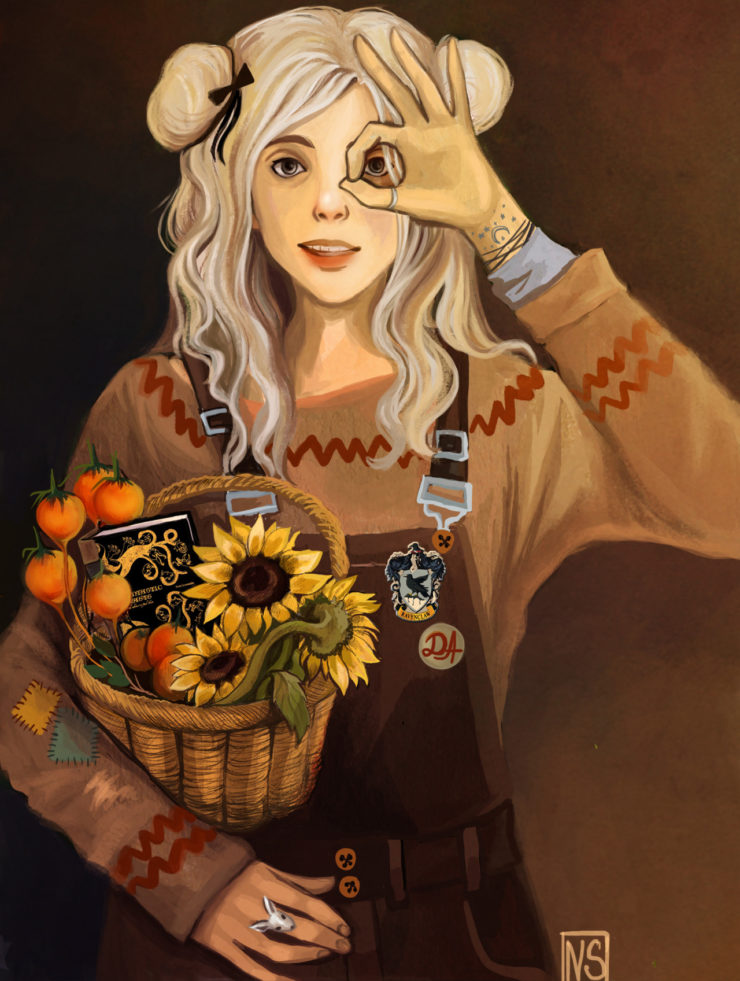
Luna Lovegood has seen more than most of the deepest-dyed cynics in the Hogwarts student body could begin to imagine.
Why should she believe that what she’s seen so far is all there is to see?
Luna doesn’t fear darkness, because she has stood in the shadow of death itself.
She doesn’t fear darkness, because she believes that there is more than darkness in the world.
So she fights.
She fights to protect the boundless possibility she believes in. She who has been called a fool for believing—she draws on her belief, pulls courage and tenacity and brass-necked audacity from it. She joins Dumbledore’s Army. She distributes counter-propaganda material, even when the punishment for doing so is torture at the hands of Dolores Umbridge. She fights the Inquisitorial Squad. She fights Death Eaters at the Department of Mysteries, and she watches Sirius die, and she’s one of the last soldiers there to fall to the enemy. She fights in the battle of the Astronomy Tower, and watches Dumbledore die. More death, always death, and still she fights.
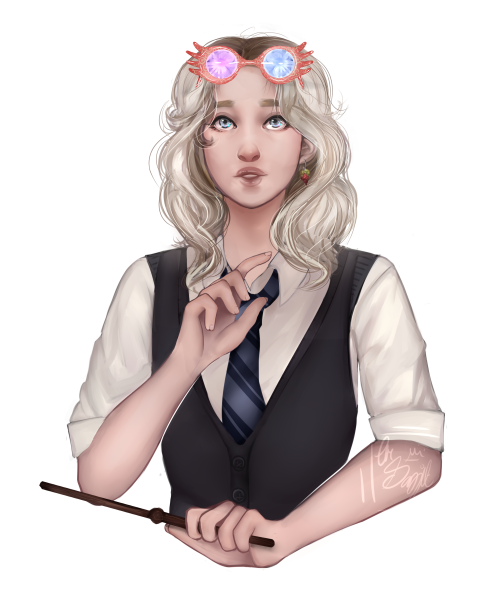
In her sixth year at Hogwarts, she resurrects the resistance under the nose of an enemy administration. She gets found out, but she doesn’t let that stop her. And she doesn’t get away with it.
She’s captured. She witnesses the brutal torture of her fellow prisoners, and is almost certainly tortured herself. She comforts those who are imprisoned beside her, giving them the strength to continue living in that place of fear and pain.
When she finally escapes and is taken to safety, she would be well within her rights to remain protected until the end of the war. But through all of that—all of the fighting and the secrets and the terror and the torture—Luna doesn’t give in. She doesn’t allow the darkness to eat at her soul and leave her afraid.
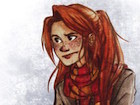
So when the Golden Trio return to Hogwarts for the final battle, and Neville Longbottom sends Luna the signal that the ultimate battle against that all-devouring darkness is about to begin, she doesn’t hesitate.
She takes up arms one last time, and she joins the fight.
Luna fights the darkness tooth and nail.
She is fearless in the face of Bellatrix LeStrange—sadist, torturer, murderess. She stands beside Ginny Weasley and Hermione Granger and fights that woman with a ferocity that can only be fed by unwavering certainty.
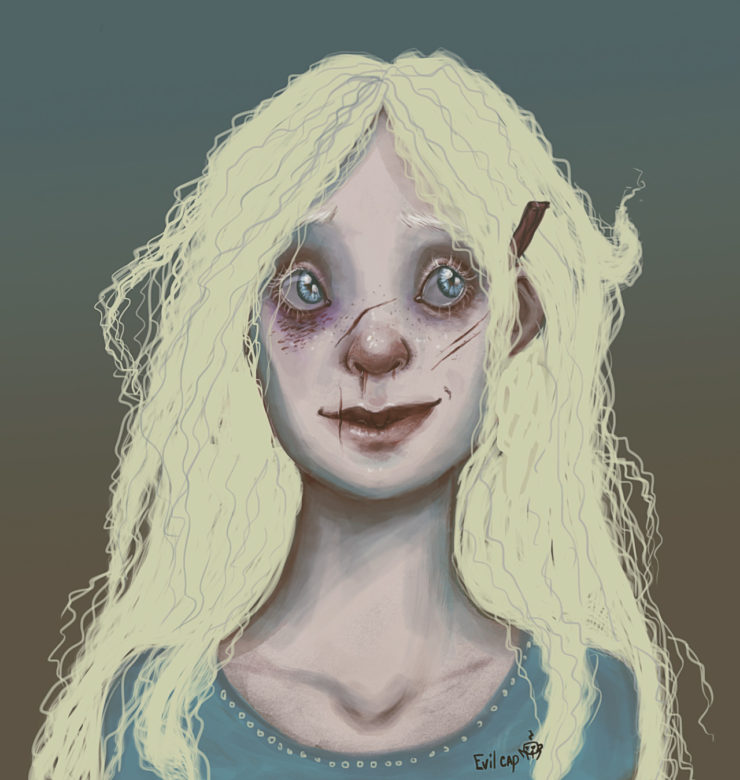
She fights, because she believes that there are things worth fighting for.
She fights, because she’s fought before and survived worse than this.
She fights, because everyone has always told her she can’t.
She fights because she doesn’t believe them.
Luna Lovegood could have given up her optimism a thousand times. Should have given it up, many would argue. Luna saw loss, saw sorrow, saw solitude and pain. She stood witness to the way death can arrive at random, without warning—and she stood witness to the ways people visit death upon each other.
She has seen blood and heard screaming. She has seen the consequences of the fight she refuses to give up.
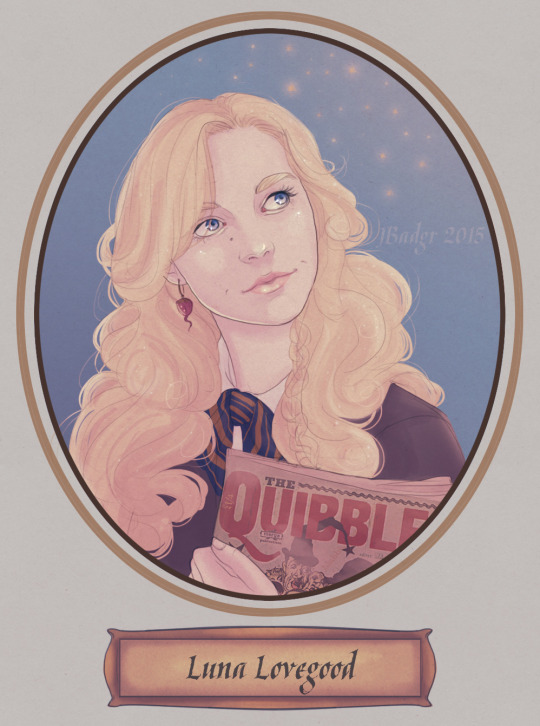
Luna Lovegood has every right to be a cynic.
She sees it. She knows it. She tells people about the loss she’s suffered, and she doesn’t hide her sorrow. But she refuses, time and again, to discard her sense of hope and wonder. Her eyes are wide open, and her fist is forever raised against tyranny, because she knows in her heart that there is more to her world than what lies in the shadows. Whatever there is to discover, she will never stop fighting for it.
She will never surrender her hope.
Top image by Megan Lara.
Sarah Gailey’s fiction has appeared in Mothership Zeta and Fireside Fiction; her nonfiction has been published by Mashable and Fantasy Literature Magazine. You can see pictures of her puppy and get updates on her work by clicking here. She tweets @gaileyfrey. Watch for her debut novella, River of Teeth, from Tor.com in 2017.










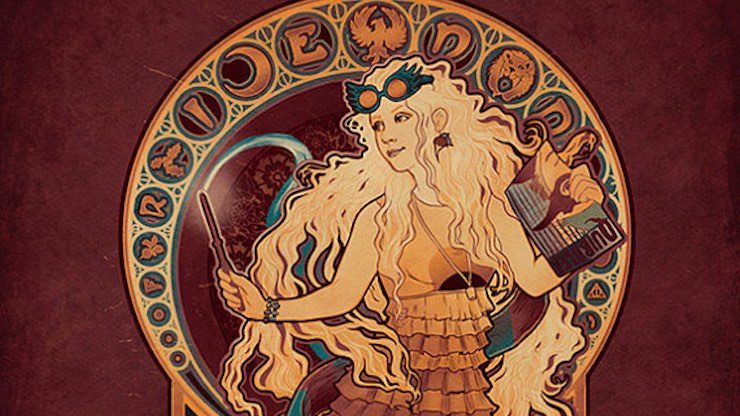
Fantastic!
Luna just became even more of a hero and role model for me than she already was.
Whew, on this morning when the news out of Aleppo continues to be horrifying, and the helplessness we feel that we can’t do anything to help, reading this got me right in the heart. I’d never thought about how Luna managed to carry on despite the things she’s witnessed, and I wonder if we have her kind of heart for the fights we face ahead. Thanks.
What, no mention of helping Harry fight off the Dementors in The Deathly Hallows?
I always thought she was an interesting foil to Hermione and wish we could have seen more of them together (to be honest, I share Hermione’s skepticism about a lot of things) but one thing you really have right (and that I love about the character) is that she is so grounded in her belief in herself and her sense of self that the opinions of others don’t phase her.
I saw FANTASTIC BEASTS, yesterday, and kept thinking of Luna and her love of strange animals. She and Newt would have been great friends.
@6, If I recall, she marries Newt’s descendant according to word of God after the series ends. :)
Perhaps what makes Luna so valuable to Harry and the DA is that her optimistic tendencies, combined with the lessons of her unconventional upbringing, leave her open to see possibilities that others are quick to overlook or to dismiss. True, this leads her to some false beliefs, but more often than not she notes something deceptively simple, or uncomfortably true, that proves to be important (a knack that Harry himself explicitly notes). Nowhere is that more apparent than the moment @4/Austin alludes to: when Harry is pinned down by dementors and struggling to summon his Patronus, Luna tells him that his friends are all there with him and still fighting. Ron probably didn’t think it noteworthy to mention something so obvious, and Hermione likely didn’t (immediately) see how the observation could help, but Luna simply recognized a good thing when she saw it—and in so doing gave Harry exactly the type of positivity he needed at that moment. IMO that is her most important contribution of the series; it’s especially great because it’s an example of her being with her friends, being completely in the moment, and having a positive outlook, i.e. quintessential Luna.
@7: Yes indeed. The Harry Potter Wiki says that Rowling says that Luna became a Magizoologist, married Newt’s Magizoologist grandson Rolf, and had twin sons, Lorcan and Lysander. Most of this pleases me greatly, but I’m dubious that she of all people would saddle a kid with the name Lysander Scamander.
I had a really rather crappy and depressing day today. (Multiple tooth extraction! Ouch!)
I’ve had a pretty depressing month or several, to be frank (as have many).
Reading this made me genuinely feel more optimistic. Thank-you.
A great tribute to a great character, who is probably my favorite from that massive cast of Potterverse characters.
At first, I thought Luna was just a goofy character inserted for a laugh.
Then, less so.
Then, this gal’s got steel…
Cynicism is comforting, in a way. I’ve certainly given in to it a LOT this year. If you always assume the worst, the world will either confirm your fears or will pleasantly surprise you. Whereas if you assume the best, you may be caught unprepared when the worst happens.
Luna’s optimism, however, is based not on the idea that the world will ultimately be okay no matter what, but on the idea that SHE has the power to change the world. She fights. She holds up her light for others. She anchors her strength in her deep-held beliefs that there is more to life than what most people perceive, that there is wonder and mystery worth investigating and protecting, and that people can be good and helpful even if they’re jerks sometimes.
I have a poster in my office that says, “Practice reckless optimism.” I’ve avoided looking at it in the past couple of months. It seems a relic of another time. How can we genuinely feel like things will turn out well, after all that’s happened? We can’t afford to bury our heads in the sand. And yet, if we flip it the other way and assume things will turn out awful no matter what we do, and that we have no power to change our lives and our world, then we’re just as bad as those burying their heads in the sand.
Be optimistic about your own powers and abilities. Know that you have so much good within yourself that you can share. Know that you can, with just a word, make someone’s day better. Know that you can influence world events if you make a few 2-minute phone calls a month. Know that the world needs you, your skills, and your talents.
We got this.
Luna is the Kimmy Schmidt of HP. Or vice versa, I guess.
“It’s so funny what people who have never been kidnapped think is scary. Talking crows? I would have LOVED to meet a talking crow!”
Thank you! Fantastic piece.
Luna’s addition to the cast was significant in that, for much of the series hitherto, every character always had the company and comfort of friends – no matter their being ridiculed for being slow-witted and fearful (Neville) or picked on for being different or an outsider (Harry, Hermione) or generally just being a-holes (Malfoy). But with Luna, we were introduced to a character who was intelligent, brave, sensitive and not an outsider, but nevertheless faced harassment and shunning simply because she failed to fit into the mould of normalcy. That she, in a boarding school, managed to chart her way alone and friendless (and not become a deranged lunatic like Voldemort) speaks volumes about her strength of character and optimism in the face of adversity.
I’ve always thought that Luna was a better match for Harry than Ginny is, much as I like Ginny. And this analysis of her confirms that for me.
@18 Me too! Harry and Luna are a good match, but I can see why JK went with Ginny…..
I was never especially enthusiastic about Harry/Ginny, either. But I expect Luna is happy with Rolf.
Funny, I felt this analysis actually showed a couple reasons why Luna wasn’t a good match for Harry. He certainly needed an injection of optimism from time to time, but being around it nonstop might have grated on him a bit. More importantly, though, her optimism and perceptiveness regarding situations was offset by a certain detachment from the people involved, which might not have worked well for a guy coping with attachment issues from his youth (an issue that probably would have sunk the SS Luneville too). YMMV depending upon whether you view her interpersonal awkwardness as a practiced wariness or as an internalized result of avoiding the messy reality that real people could pretty much never live up to her sunny, nonconformist worldview.
But if Rolf takes after grandpa Newt at all then I think he and Luna must get on splendidly!
Nicely written. It partly sheds light on why characters like Luna are bearable in fantasy and completely obnoxius in real life.
That was great, thanks.
I’ll add here a qoute of myself (weird thing to do), as I posted on another thread concerning Luna :
“Luna – she was brilliant, because, while the magic world considered us muggles as shortsighted in what there is in the world, she made them look like muggles, as she believed/saw magic were others wouldn’t. Who said there’s no more magic to find. Who said the magic comunity knows all the secrets of the magical world? It was funny that as they looked down on muggles for having no clue, they were also the ones in her opinion who are rather clueless…”
truly fantastic, this is so powerful and incredibly well written. you did a lovely job.